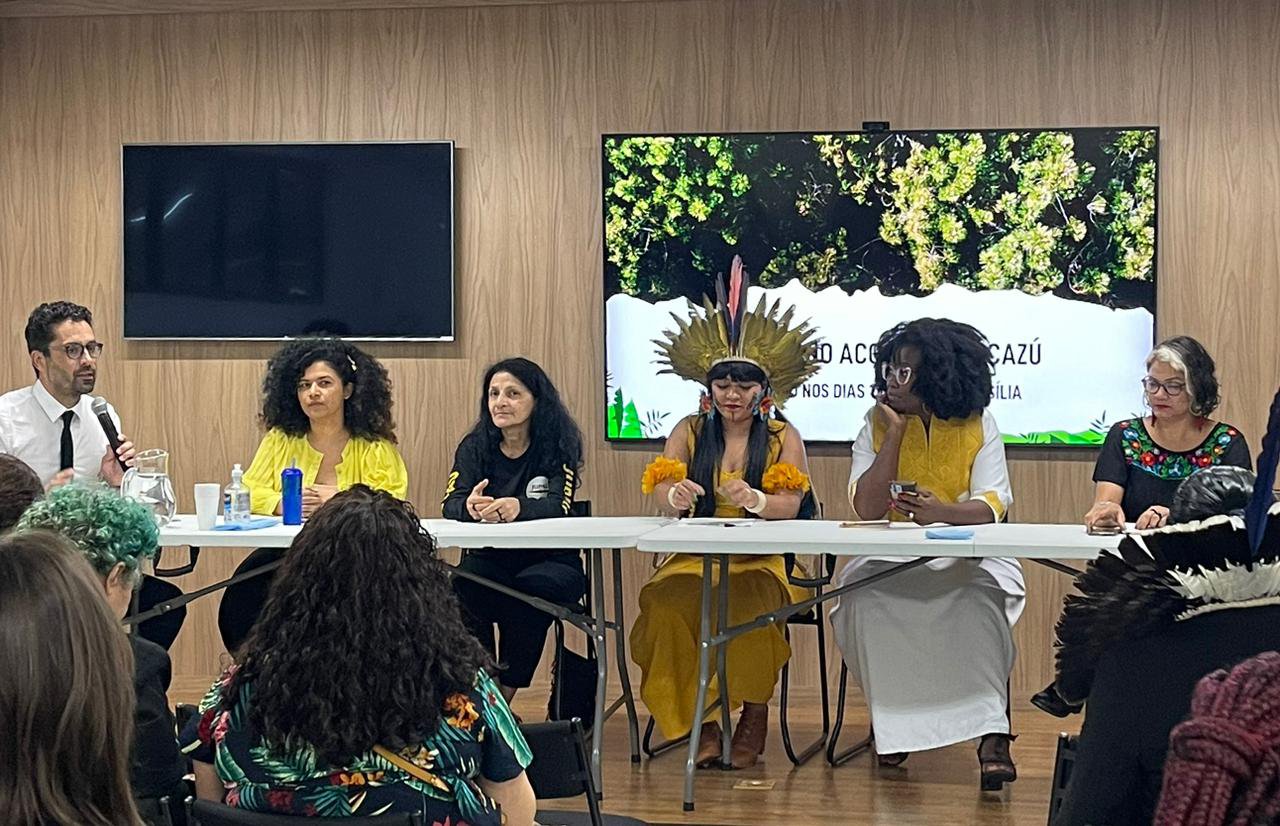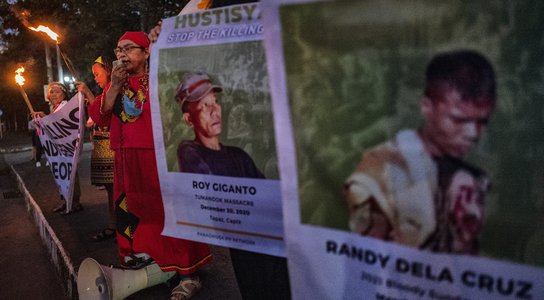Brazil, one of the deadliest countries in the world for land and environmental defenders, has not yet ratified the Escazú Agreement, which would see the enforcement of greater protections for activists across the country. While the ratification process in the Brazilian Congress may be challenging, the new administration must prioritise this effort to create a safe and enabling environment for its defenders.
Last week, Global Witness joined an important event in Brasília organized by Fundação Esquel, Instituto Nupef and WWF, which brought together Brazilian land and environmental defenders, national and international civil society organisations with Members of the Brazilian Government and Congress. This included the Indigenous People’s Minister, Sônia Guajajara, and representatives of the Ministry of Foreign Affairs, the Ministry of Environment, and the Ministry of Human Rights, as well as Members of Congress Duda Salabert and Célia Xakriabá. We all came together from across the country to discuss an urgent common goal: the ratification of the Escazú Agreement in Brazil.
What is the Escazú Agreement?
The Escazú Agreement is the first regional environmental and human rights treaty in Latin America and the Caribbean, and the first legally binding instrument in the world to include provisions on the protection of land and environmental defenders. Most significantly, the Agreement requires governments to prevent and investigate attacks against environmental defenders. The Agreement also addresses crucial issues such as access to information, public participation, access to justice and guaranteeing a safe environment for activists.
The Agreement entered into force in April 2021, requiring states to prevent and investigate attacks against defenders, and has so far been signed by 25 nations in Latin and Central America – including Brazil. Countries such as Mexico, Bolivia, Ecuador, Chile, Argentina and Colombia have already moved forward and ratified the Agreement - an important step needed to make it legally binding in their countries.

Panelists at the Escazú event in Brasilia. From left to right: Rodrigo Morales (Fundo Casa), Alane Luzia da Silva (Terra de Direitos), Neidinha Suruí (Indigenous activist, Associação Kanindé), Congresswoman Célia Xakriabá, Selma Dealdina (Quilombola activist, Fundo Casa), Claudelice Santos (Instituto Zé Cláudio e Maria).
Why Brazil must ratify the Agreement
As one of the deadliest countries in the world for land and environmental defenders, Brazil must follow suit. Our investigations and research have shown how the former Brazilian administration has undone protections for Indigenous, Quilombolas and other traditional communities, infringed upon land rights, attacked conservation groups, and dismantled and slashed the budgets and resources of the very institutions that were meant to protect traditional communities. This has been fuelling impunity for attacks against defenders.
In our report published last year on killings of land and environmental defenders, Decade of Defiance, Brazil recorded the highest number of deaths of defenders in the world between 2012 and 2021, with 342 people killed. Around a third of those murdered in Brazil were Indigenous or Quilombolas, and more than 85% of killings took place within the Brazilian Amazon. Minister Sônia Guajajara cited our data and analysis at the Brasilia Escazu Event as supporting evidence for the Agreement's ratification and we hope that our reporting continues to serve as a tool to expedite ratification.
At the meeting, congresswoman Célia Xakriabá stressed the difficult reality of defenders in Brazil who, according to her, have been the real ‘ministers of environment’ for the past four years. Those who ‘risked their lives to protect the environment, while the government was acting to destroy it’. She sees the new administration in Brazil as providing new hope for defenders.
Among other relevant changes that have been implemented by the new Government, on the week of 10 April 2023, the Agreement was finally sent to the Executive Office of the President. This is an important first step as it kicks-off the process for ratification, and can be officially sent to Congress for voting – five years after the country signed the Agreement.
We hope that the Government will shortly submit the bill, with the Agreement’s terms, to Congress in the coming days. We are encouraged by Brazil’s Minister of Environment, Marina Silva, attending the inauguration of the Second Meeting of the Conference of the Parties to the Escazú Agreement taking place this week in Argentina.
The challenge ahead
Expectations for ratification in Brazil are high. Nevertheless, the voting pathway for the Agreement’s ratification is likely to be filled with obstacles and challenges.
Before it goes to the President for ratification, the bill must be voted on by several special commissions formed by members of congress and by both Houses of Congress – the Chamber of Deputies and the Senate – which can turn out to be a very lengthy process. Besides the inherent obstacles of a complicated legislative procedure, another challenge will be securing a majority to vote in favour of the ratification. The recently elected Brazilian Congress is still considered to be conservative and mostly in favour of the agribusiness and large corporation’s agenda.
Opposition to the Agreement is expected, which means that pressure from Brazilian and international civil society will be key for it to pass by Congress. But there is no more time to waste. The lives of Brazilian defenders must be prioritised after four years of inaction from the former government, lack of accountability and of systematic attacks by destructive agribusiness, mining, logging and other sectors. They are on the frontline of protecting the Brazilian Amazon and are under relentless attack.
Along with 144 organisations, Global Witness has signed an open letter to the Brazilian Government and we stand in solidarity with the newly launched "Movement Escazú Brazil" consisting of defenders and civil society organisations in Brazil calling upon the Brazilian Congress to ratify the Escazú Agreement and create a safe environment for land and environmental defenders.


